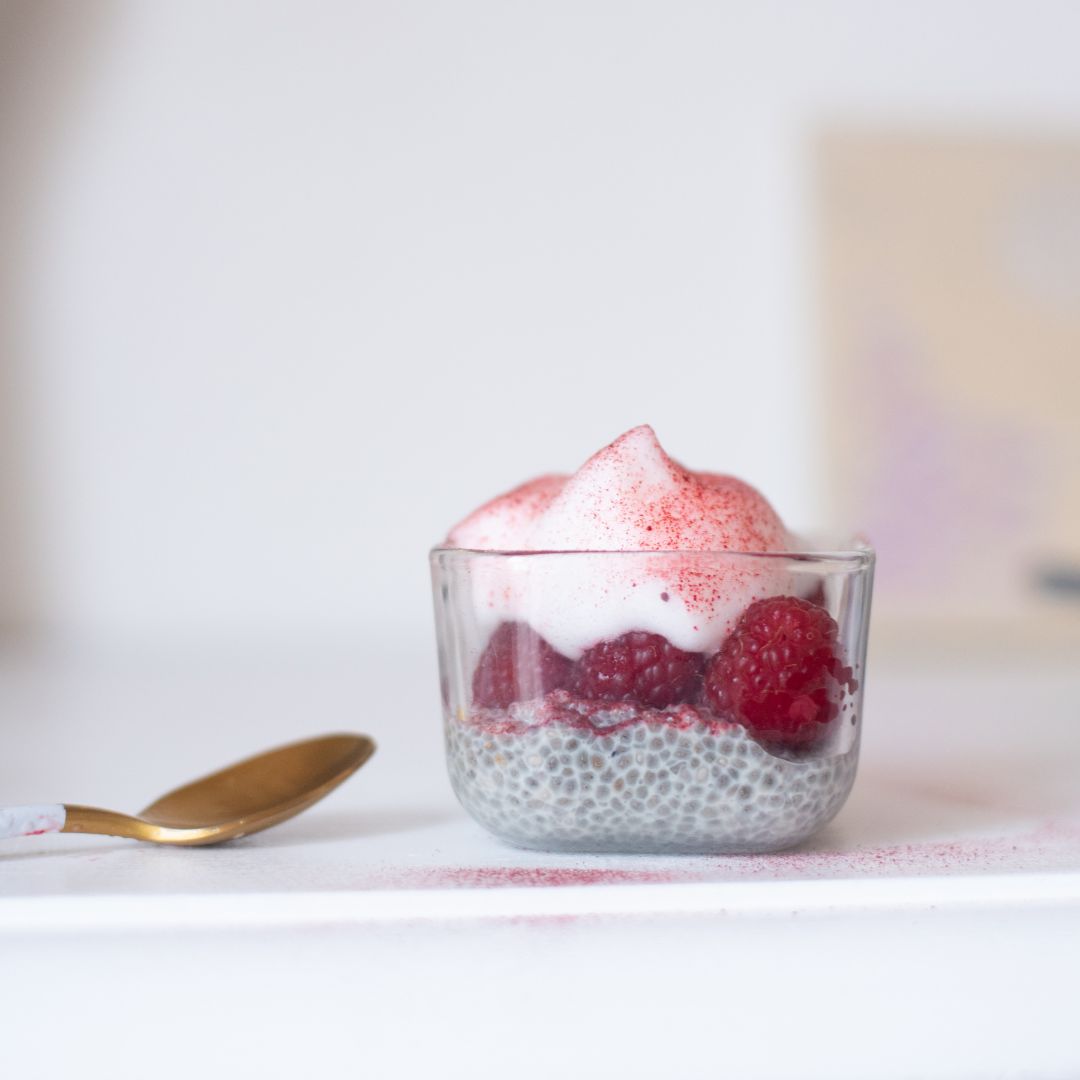
Pomegranate and Pistachio Chia Pudding
This is a very easy breakfast to make! It’s protein-rich and full of gorgeous antioxidants. If you double or triple the proportions, you can make 3 at a time. Pop them in the fridge and they will keep up to 3 days. Perfect for batch cooking.
Ingredients:
3 tbsp chia seeds
180ml coconut or almond milk
(unsweetened)
1 tsp vanilla extract
40g pomegranate seeds
1 tbsp pistachios, chopped
Method:
1. In a small bowl, combine chia seeds, vanilla, and milk
2. Cover and refrigerate for 4 hours (or overnight, if possible)
3. When ready to serve, stir the chia mixture, then layer in a glass with pomegranate seeds
4. Top with pistachios
5. Enjoy!

How to Break Through a Plateau
When you have a specific health goal and feel you are putting in the work, it’s tough when you don’t see the changes you feel you deserve. It’s tempting to give up, but here’s what to do instead.
If progress is disappointing, it’s time to check in with how you feel. Progress is not just a number on the scales and, in many cases, the scales can be misleading. If your goal isn’t just weight loss, a temporary stall in progress can be just as frustrating, with symptoms seeming to vanish one week, but reappear the next. Progress is rarely as straightforward as we think.
In this blog, I’ll be focussing on weight loss plateaus but you can add in your own situation.
What is a weight loss plateau?
A weight loss plateau refers to a phase in your weight loss journey where progress comes to a temporary halt despite your continued efforts. It can be both frustrating and demotivating.
Understanding the dynamics of why this happens is crucial for developing effective strategies to overcome them.
Common causes
Metabolic adaptation: One primary cause of weight loss plateaus is the body's ability to adapt to changes in calorie intake and expenditure. As you lose weight, your metabolic rate may decrease, meaning your body burns fewer calories at rest. This adaptive response can make it challenging to sustain the initial rate of weight loss.
Psychological factors: Psychological aspects play a significant role in weight management. Stress, emotional eating, and other mental health factors can contribute to plateaus. For instance, heightened stress levels can lead to hormonal imbalances that affect metabolism and appetite, hindering weight loss progress. Don't underestimate the power of stress to impact every aspect of your health.
Inconsistent action: It’s easy to be keen and compliant when you first start your programme but, over time, bad habits and inconsistencies can creep in, whether that’s more treat foods, more glasses of wine, or irregular workout patterns.
It’s not simply the number on the scales that can show up.
Lack of change in measurements: A plateau often extends beyond weight loss alone, affecting overall body composition and shape. This might mean measurements such as waist circumference, hip circumference, and other body dimensions stall too.
Emotional and psychological indicators: Forget about the tell-tell signs just being physical. You might also experience heightened frustration, demotivation, or a sense of being stuck in your journey. Emotional eating patterns may also emerge as a response to the perceived lack of progress, further complicating the weight loss process.
Plateaus vary from person to person
Weight loss plateaus are not one-size-fits-all – just like your food plan! They manifest differently for everyone. Factors such as age, gender, genetics, and overall health can influence the nature and duration of plateaus. Some people may experience a brief slowdown in weight loss, while others might encounter a more prolonged and stubborn plateau.
Here are some thoughts for those weeks when things don’t go to plan for whatever the reason.
Quick wins
The basic advice is to keep going. Plateaus are very common and often my clients trust the process and soon things start moving in the right direction again.
In the short term, you can try one of these little boosters:
One of the most important things you can do is to focus on what has gone well. Ask yourself, what am I pleased with that has gone well this week? What other improvements have you noticed?
Keep your eye on the prize. One of the things I’m keen to do as a coach is to help my clients work out why change is important for them. This helps keep focus when a plateau happens. If you’d like to know more about the support I can give you, why not book in a free call here?

As you gear up for another start to a New Year, you might find yourself in the familiar territory of making resolutions in the hope that they somehow stick. You know the drill – enthusiastic promises to hit the gym regularly, eat more greens, lose that extra weight, get more organised, or maybe cut back on alcohol.
How often have those January aspirations fizzled out by the time February rolls around? It's a tale as old as time – the grand intentions, the initial burst of motivation, and then... well, life happens.
It’s not just you. New Year is a time of hope and anticipation, and it genuinely is a really good time to think about how you want your life to be in the coming year. However, the fact that there is already a day set aside each year – it’s called Quitters Day – for the collapse of New Year resolutions, shows that many of us struggle to stick to our good intentions. It’s the second Friday of January – this year it’s the 12th.
The fitness app Strava conducted some research back in 2019 that showed 80% of those who made resolutions had given up by the end of the month and that the second Friday in January was when most started their inevitable decline.
Why can’t we stick to our New Year resolutions?
You can probably imagine the biggest problems and I am sure you will have experienced them for yourself at some stage or another.
The initial resolution was over-ambitious.
You start off filled with enthusiasm but couldn’t maintain the same level of commitment.
I’d like to offer a potential solution to both in a moment. To offer a little branch of hope right now, there is also a New Year’s Resolution Recommitment Day, which is perfect for anyone who slipped in January and needs an official day to get back to their goals.
Do you struggle to stick to your goals?
If you struggle to stick to goals, you’ll benefit from re-visiting your goal-setting strategy. Knowing what you want is just the first step – knowing how to get there is as – if not more – important.
So how do you set goals that lead to success?
You might already have heard about SMART goals but making them SMARTER is even better (and a lot more fun). This means setting goals that are:
Specific
Measurable
Achievable
Realistic
Time-bound
Exciting
Rewarded
Specific
The goal must be clear and concise. Vague goals, such as “I want to get healthy” don’t tell you, or anyone else, what you are aiming for. This makes it difficult to know when you’ve reached the goal. It might be worth looking at things like being able to fit into a specific pair of trousers or being able to get to the end of that 5k run without stopping – or other specific activities like getting out on a walk or doing some guided meditation.
Measurable
The goal must contain measurable criteria for tracking progress. If your goal isn’t specific, you can’t measure it. Ensure your goal has a clear measurable component that you can track to see how close you are to the desired end point. If you are thinking about weight loss, the scale and the tape measure will be needed. You might well want to use both – sometimes the number on the scale doesn’t give the full picture. Or you might be measuring how long you can run, how many Zumba classes you attend, how many times you listen to a sleep story.
Achievable
The goal must be practically possible, yet still challenging. This is something to bear in mind if you tend to have lofty plans. It’s a balance of being able to actually do it and it being sufficiently challenging to motivate you to spend time and energy pursuing it. For example, if you want to run a marathon and find it relatively easy to get outdoors to run but regularly only run 10km, the goal might be achievable and challenging. If you don’t currently run and never have…
Realistic
The goal must be realistic in the long term. It is important to ask yourself, “can I actually do this?” and “is it realistic given my current circumstances?”. Not in a self-doubting kind of way, but in a rational, carefully thought-through way. Thinking about goals that might relate to losing weight or exercise, there is a sweet spot between setting goals that feel a bit of a stretch and setting those that are over-optimistic or that require time that you just don’t have.
Time-bound
The goal should be grounded within a specific timeframe. When will you do this by? Having a scheduled completion date greatly increases your odds of reaching your goals. When you know your cut-off date, you know how to pace yourself and prioritise your time, energy, and resources. It can really help focus your energies and keep you motivated as you check in with yourself towards the end of the timeframe. A bit like that extra burst athletes get at the end of the race as they sprint towards the finish.
And now come the BEST bits…
Exciting
The goal must be enticing and inspiring. Does the thought of the goal excite you? Many people pursue goals because they feel they ‘must’, ‘should’, or because others want them to, rather than because they truly want to achieve the goal. Make sure your goal energises you and is personally motivating. Focus on what will be possible for you when you reach your goal. How will it really feel when you achieve what you set out to do? I want you to get really fired up by your goal!
Rewarded
The goal must offer a clear reward. This can be an extrinsic reward (something tangible such as money, awards, savings, or prizes), or intrinsic (joy, happiness, mastering a skill, or satisfaction of a job well done). If you aren’t getting some benefit or reward for reaching your goal, your motivation is likely to dip. How will you reward yourself? What will feel like a real win? Remember, since we’re in the world of wellness, I’m not talking about having a big blow-out at the end of a diet but something more nourishing of the soul…
You can complete the following statements/questions to help you set your goals:
My goal is...
It is clear and specific in the following way...
How will I know if I’ve achieved it? I can measure success in the following way...
My goal is realistic because...
What are my time frames? By when will I have achieved this goal?
What is exciting about this goal? What inspires me?
What are the rewards? How will this benefit me and my life when I have achieved it?
Fun fact
Research shows you’re more likely to stick to a goal that is action-oriented rather than an avoidance-oriented goal (58.9% versus 47.1%).
Every goal is easier to achieve with support. Perhaps you see it as a form of motivation if you insist on going it alone. Wouldn’t it be great to prove to others or yourself that you can do it? It certainly would, but why struggle? Why not make your life easier by getting support?
The Fix: Book a complimentary call with me here
Let’s work together to tackle all aspects of what I’ve been talking about above. I’ll bring the knowledge of what to eat for your goals and support you to create healthy habits that last. I’ll also be your cheerleader if you experience any barriers or setbacks that look like they might stand in the way of you achieving your goals.
Now is exactly the right time for a brand new you: new diet, new attitude and new healthy lifestyle habits.

Seven Steps to Supporting Your Immunity this Winter
If you're looking to ramp up your immune health this winter, you might be wondering, "How do I gear up my body to tackle those pesky illnesses?" Well, supporting your immunity isn't a walk in the park, but a few tweaks in your lifestyle and diet can give your body's defence system a serious upgrade against those sneaky pathogens.
There's a real connection between sleep and keeping your immune system in top-notch shape. Skimping on sleep? That's like sending an open invitation to sickness.
In a study with 164 healthy adults, the ones catching fewer than 6 hours of Zs were more likely to catch a cold. Adults, aim for 7 hours or more; teens, 8–10 hours; and the little ones, up to 14 hours. Having trouble dozing off? Try ditching screens an hour before bedtime and make your sleep space as dark as Batman's cave.
Load up on the good stuff – fruits, veggies, nuts, seeds, and legumes. They're packed with nutrients and antioxidants that put up a strong front against those nasty pathogens.
Think of them as your immune system's cheerleaders, fighting off inflammation and giving those free radicals a run for their money. Plus, they're like a feast for the good bacteria in your gut, making your immunity top-notch.
Embrace healthy fats like those found in olive oil and salmon. They're like the superheroes that calm down inflammation, preventing it from taking over.
Olive oil is not just anti-inflammatory; it's linked to keeping chronic diseases like heart disease and type 2 diabetes at bay. And let's not forget omega-3 fatty acids from salmon and chia seeds—they're inflammation-fighting champs too.
Keep an eye on added sugars and refined carbs. Research hints that they might have a hand in the overweight and obesity drama, and that duo could make you more susceptible to falling sick.
According to a study, folks with obesity were twice as likely to catch the flu even with a vaccine. Cut down on sugar, dial down inflammation, lose a bit of weight, and decrease your risk of chronic health issues.
Exercise is like a booster shot for your immune system. Not the hardcore, intense stuff, but a moderate, feel-good workout. It can even make vaccines more effective!
Regular moderate exercise is the friend your immune cells need to stay in shape and ready for action. Think brisk walks, steady biking, a bit of jogging, or a splash in the pool—aim for at least 150 minutes a week.
Water, water, water—it's your health's best friend. While it won't shield you from germs, staying hydrated is crucial for overall well-being.
Dehydration can mess with your head, focus, mood, and even kidney function, making you more prone to getting sick. Keep that urine pale yellow, and you're on the right track. Watch out for the sugar content in other types of drinks, especially juices and fizzy drinks.
Stress and your immune system? Not best friends. Long-term stress can mess with your immune cell squad and promote inflammation. Kids aren't spared either; their immune response can take a hit.
Combat stress with a dose of meditation, a bit of exercise, scribbling in a journal, yoga, or anything that brings zen vibes. Talking to a counsellor or therapist, virtual or in person, might be a game-changer too.
If you’d like to find out more about how you can support your body’s natural immune system over Winter, why not book in a call here.

Spiced Walnut and Squash Loaf
If you’re having guests over the Christmas period, this is an excellent – and quick! - alternative to Christmas cake. And on the plus side it has some hidden veg in it too!
Serves 6-8 people
Ingredients:
175g rice flour
1 tbsp ground almonds
170g coconut sugar or 85g Stevia, if you prefer
2 tsp cinnamon
½ tsp ground nutmeg
3 cloves
3 tsp gluten-free baking powder
50g dark chocolate, broken into chunks chunks (optional)
1 medium ripe avocado, pitted
½ tsp salt
230g butternut squash purée (dice a medium size squash, steam until soft, then either mash or put in a blender to purée)
1 egg
60g natural or coconut yoghurt
1 tsp vanilla paste
Two handfuls of walnuts, chopped
Method:

If food isn't the problem, is it the booze?
What I hear from clients is, it’s not always the food that’s the problem – it’s the booze.
Often partygoers who are cautious about their alcohol consumption are viewed with suspicion. If you want to have a few glasses of wine, have a few glasses of wine. But make that decision inside of what you know to be your social schedule over the entire Christmas period.
One of the little tricks I often use is to look at my health goals alongside my social calendar and choose what I want to commit to. I choose when I want to drink, roughly how much I want to drink, and when I want to be the designated driver and not drink.
I’m not suggesting for a minute that you have to cut back at Christmas. Yet I know that many of my clients get carried away by the spirit of Christmas (excuse the pun), whether it’s a fun wave to ride or not. This year, how about YOU choose what you want to do and when you want to do it.
Here are a few suggestions for cutting down – if that’s what you choose to do:
And how much booze is too much? The official stats are no more than 14 units of alcohol a week for adults (both men and women). Consider a large glass of wine at today’s typical strength is 3.5 units, a 330ml bottle of 5% beer is 1.7 units and a single shot of 40% spirits is 1 unit. It quickly adds up.
Without wanting to be a party pooper, the NHS considers an alcohol ‘binge’ to be drinking 6 (women) – 8 (men) units of alcohol in a single session. Just to give you some perspective. If you’re a wine drinking, you can soon see how quickly you are in that territory.
As a rule, try to have more booze-free nights than not to allow your body to recover.
On those nights that you don’t drink at all, you’ll sleep better, wake feeling more refreshed, you’ll have much more energy, and your mood will be better. The impact on your waistline will be positive, too – alcohol is a major contributor to belly fat and is brimming with unnecessary calories.
And if you’re choosing what to drink over the festive period, the best options, when it comes to alcohol, are all those non-creamy, non-sugary drinks. Pretty much in this order: dry champagne, vodka and soda with a squeeze of lime (I have also tried this with gin – surprisingly nice!), dry white or dry rosé or red wine. A gin and tonic has a fair amount of sugar thanks to the tonic. Things like dark rum, port, sherry, liqueurs, fruit juice-based cocktails and spirits with sugary mixers like Coke or lemonade are total sugar bombs (sorry if you are a fan of Bailey’s or Southern Comfort and Coke…).
But this a festive period and you definitely want to have fun! Just make sure that it’s the type of fun you actually want to have – you are in charge and you can do what you want at this time. Enjoy!
![]()
Please get in touch and find out more - I offer a free 30-minute exploratory call.